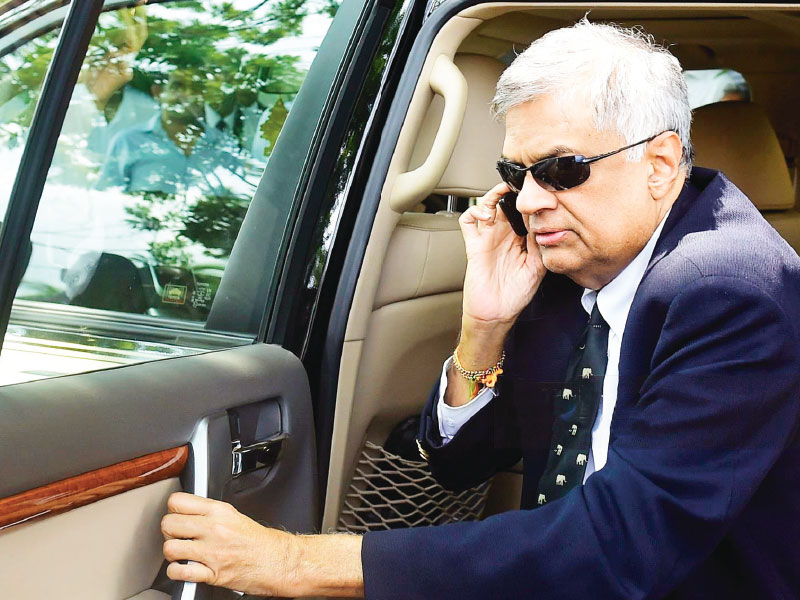-By LeN Colombo Investigative Correspondent

(Lanka-e-News -28.June.2025, 9.10 AM) While the nation struggled through economic austerity, political instability, and IMF-enforced belt-tightening, Sri Lanka’s former interim President Ranil Wickremesinghe quietly cultivated a reputation of a different sort — one more at home on a runway than in a parliament chamber.
New revelations emerging from the Criminal Investigation Department (CID) and recently tabled before the Colombo Fort Magistrate’s Court expose an extraordinary record of state-sponsored globetrotting: over 426 individuals are confirmed to have accompanied President Wickremesinghe on 23 foreign tours between 2022 and 2024.
The total bill to the taxpayer? A staggering over Rs. 1 billion — enough to build several rural hospitals or fund a year’s worth of free school lunches.
Yet, the question remains: What national purpose did this serve? Or was it simply a diplomatic joyride at public expense?
The breakdown of Wickremesinghe’s global engagements reads more like a manifesto for high society diplomacy than crisis management. According to official figures submitted to court:
In 2022, during the immediate aftermath of Gotabaya Rajapaksa’s resignation, Wickremesinghe led 4 foreign visits, accompanied by 63 individuals, at a cost of Rs. 130 million.
In 2023, this ballooned into 14 foreign tours with a mind-boggling 252 delegates, at an expense of Rs. 578 million.
By 2024, despite growing domestic calls for fiscal prudence, 5 more overseas visits followed, involving 111 participants, costing another Rs. 300 million.
Cumulatively, 426 individuals partook in state-funded travel over three years — averaging nearly 20 companions per trip.
From New York to Tokyo, Brussels to Davos, the Wickremesinghe entourage moved with all the fanfare of a royal caravan — except, unlike royalty, these journeys were financed not by inherited wealth, but by the wallets of Sri Lanka’s weary, tax-paying public.
These revelations are not merely anecdotal — they are now the subject of active criminal investigations, with CID detectives pursuing leads into possible misuse of state funds, fraud, and excessive travel allowances. Court records confirm that multiple case files — numbering over 400 — have been opened, each documenting the composition, cost, and purpose (or lack thereof) of these trips.
Legal sources confirm that the CID is particularly scrutinising:
Duplicated per diem claims
Unexplained first-class upgrades
Payments for non-official family members or donors
Procurement contracts signed abroad without parliamentary oversight
One CID officer described the evidence trail as “an Air Lanka of corruption — sleek on the outside, but overloaded with baggage inside.”
News of these excesses has provoked a wave of public backlash. Opposition MPs have dubbed it the "Air Ranil Scandal," with social media awash in memes showing Wickremesinghe piloting a private jet full of suit-clad bureaucrats and unnamed ‘guests’ — while ordinary Sri Lankans queue for kerosene.
“It’s grotesque,” said one teacher from Galle, speaking anonymously. “We were told there’s no money for textbooks, but there was plenty for globe-trotting with political yes-men.”
An NPP-affiliated economist wryly noted, “He didn’t take a Cabinet with him, he took a carnival.”
Insiders allege that the presidential entourages included not only senior diplomats and ministers, but also:
Friends of politically connected families
Business magnates hoping for international deals
PR consultants, stylists, and personal aides
University students sponsored as “youth delegates”
One official, who wished to remain unnamed, stated:
“There were trips where more people attended dinners than official forums. In some cases, there weren’t even scheduled bilateral meetings — just receptions and photo-ops.”
Hotel bookings included five-star suites in Manhattan, presidential penthouses in Tokyo, and luxury resorts in Abu Dhabi — all booked through “special diplomatic rates,” which conveniently bypass tender procedures.
The contrast could not be more striking. While the general public endured soaring VAT, shrinking rupee values, and power cuts, Wickremesinghe’s international tour manifest resembled a script from Crazy Rich Asians: South Asian Chapter.
Sri Lanka’s budget deficit in 2023 exceeded Rs. 2 trillion — yet Rs. 100 crores was spent on travel, largely with no measurable economic return. One financial analyst estimated that over 80% of these trips resulted in no formal agreements, just communiqués and vague MOUs that “will be explored in the future.”
In one instance, a presidential team travelled to an economic summit in Europe with three secretaries for the same ministry — none of whom returned with an actual trade deal.
The NPP government, elected on a reformist, anti-corruption ticket, has vowed that the “Air Ranil” case will not be buried like other scandals. Attorney General officials have confirmed that auditor-general reports are being used in conjunction with CID findings to build criminal cases where applicable.
Prime Minister Harini Amarasuriya, addressing Parliament earlier this week, declared:
“No one, no matter how seasoned or senior, will be above the law. If state funds were misused, restitution will be demanded.”
NPP insiders say the ultimate aim is to recover at least a portion of the misspent funds and institute a permanent audit framework for all future official travel.
As the controversy escalates, Ranil Wickremesinghe himself has remained notably silent, making no public statement or denial. His office has declined to comment on specific figures, instead issuing a general statement about “Sri Lanka’s international engagement being essential during a period of economic diplomacy.”
Critics, however, argue that diplomatic necessity cannot be used as a blank cheque for unchecked expenditure. Former diplomat Dayan Jayatilleka commented:
“There’s a difference between statesmanship and spectacle. Sadly, this looks like the latter.”
In a nation long plagued by political indulgence and elite impunity, the unfolding “Air Ranil” saga may serve as a defining test for Sri Lanka’s post-crisis governance.
With over 400 individual cases under review, and court filings increasing weekly, the NPP government now faces its own test: whether it can successfully hold the past accountable without becoming distracted from the future.
Meanwhile, the public waits — receipts in hand, outrage intact, and an unshakable sense that while they couldn’t afford petrol, someone else was flying high at their expense.
-By LeN Colombo Investigative Correspondent
---------------------------
by (2025-06-28 07:30:58)
Leave a Reply